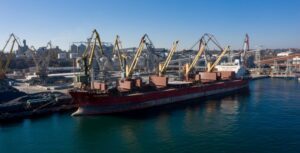
The leaders of Azerbaijan, Georgia, Romania and Hungary have signed an agreement on laying a submarine electric cable under the Black Sea to supply Azerbaijani energy to Europe.
Ursula von der Leyen, head of the European Commission (EC), considers the Black Sea electricity cable project, which will supply Azerbaijan with electricity to Europe, ambitious.
“I can only say: what an ambitious project (of the Black Sea electric cable). It will connect us on both sides of the Black Sea and go further toward the Caspian Sea – both for digital communications and energy,” von der Leyen said Saturday at a signing ceremony in Bucharest for the “Strategic Partnership Agreement on the Development and Transmission of Green Energy between the governments of Azerbaijan, Georgia, Romania and Hungary.”
She said the implementation of the agreements will help the European Union strengthen security of supply by transmitting electricity from renewable sources to the EU through Romania and Hungary. “A cable under the Black Sea could supply electricity to our neighbors in Moldova and the Western Balkans and, of course, to Ukraine,” the EC head said.
According to EU Commissioner for Enlargement and Neighborhood Policy Oliver Varghea, an agreement between Azerbaijan, Georgia, Romania and Hungary on a submarine cable for electricity transmission via the Black Sea (Black Sea Energy) was signed as part of a EUR 17 billion European investment plan.
The nearly 1,200-kilometer cable will transmit electricity from Azerbaijan and Georgia to Romania and Hungary. The project is to be implemented within six years.
Average salary of staff employees be regions (UAH)

State employment center

The Cabinet of Ministers of Ukraine included Uzhhorod industrial park in the register of industrial parks, the Economy Ministry’s press service said on Friday.
“The government is pursuing a consistent policy of creating conditions for the development of industrial parks as points of economic growth and post-war reconstruction of the country. The development of industrial parks will contribute to the recovery of industry, including export-oriented, with a high share of added value. It will also contribute to the development of local communities: they will get new budget revenues, new small and medium enterprises will be created in their regions”, stated First Deputy Prime Minister, Minister of Economy Yulia Sviridenko.
The new industrial park is situated in the city of Uzhgorod in Zakarpattya region. According to the concept of the industrial park, up to 500 working places in the production sphere (processing industry) are supposed to be created on the area of 10,1907 hectares.
Today the register of industrial parks includes 60 industrial sites.

The ninth package of EU sanctions against Russia adopted on Friday allows Bulgaria, Hungary and Slovakia, which received a reprieve from the European Union’s oil embargo on Russian oil, to export oil products produced from it to Ukraine.
The EU Council resolution published in the EU Official Journal on December 16 says the decision “allows Hungary, Slovakia and Bulgaria to export to Ukraine certain refined products derived from Russian crude oil imported on the basis of the considered derogations (from the embargo – IF), including, if necessary, by transit through other member states.”
Another paragraph of the ruling allows Bulgaria to “export to third countries certain petroleum products derived from Russian crude oil imported on the basis of the derogations under consideration.
The publication attributes this to the need to “reduce environmental and safety risks, as such products cannot be safely stored in Bulgaria.
The document specifies that the respective annual exports should not exceed the average annual volume of exports of such products for the last five years.

A dry cargo ship with more than 32,000 tons of corn left a Ukrainian port on Friday, the Joint Coordination Center (JCC) reported.
“On December 16, the vessel Almeray left the port of Odessa, it is carrying a total of 32.4 thousand tons of corn to Libya as part of the Black Sea Grain Initiative,” the report said.
There are two dry-cargo ships headed for Ukrainian ports, which on December 16 passed through the maritime humanitarian corridor.
“As of December 16, the total tonnage of grain and other agricultural products exported from the three Ukrainian ports is 14,023,297 tons. A total of 1,112 vessels were allowed to move so far: 556 to arrive at Ukrainian ports and 556 to leave them,” summarized the JCC.
It is noted that from December 1 to 15, more than 1.6 million tons of Ukrainian food products were shipped to other countries.
As many as 13 million tons were shipped on December 5, 12 million tons on November 26, 11 million tons on November 16, 10 million tons on November 3, 9 million tons on October 28, 8 million tons on October 21, 7 million tons on October 12, 6 million tons on October 5 and 5 million tons on September 28.